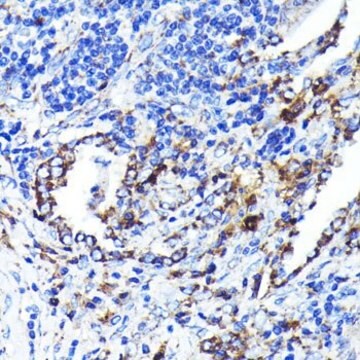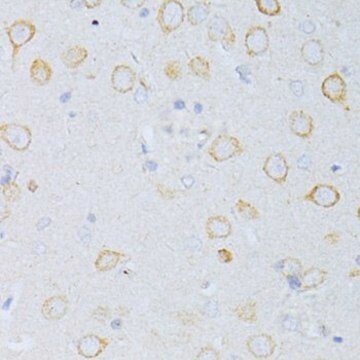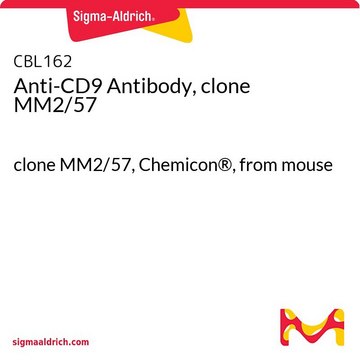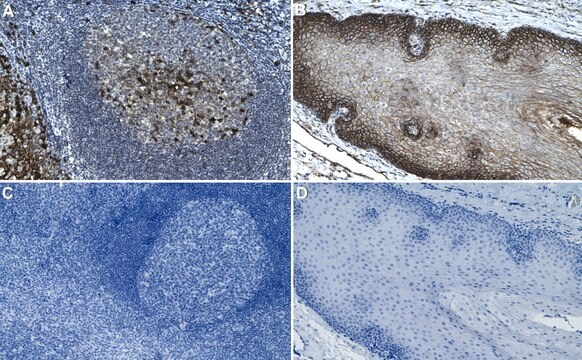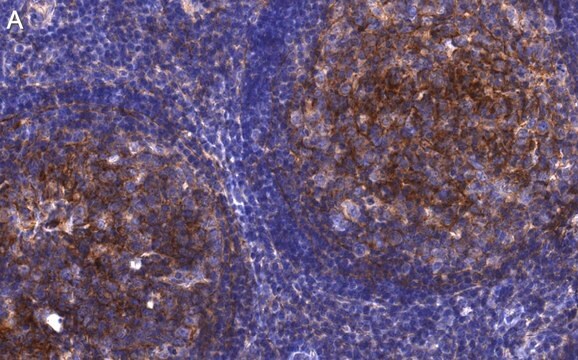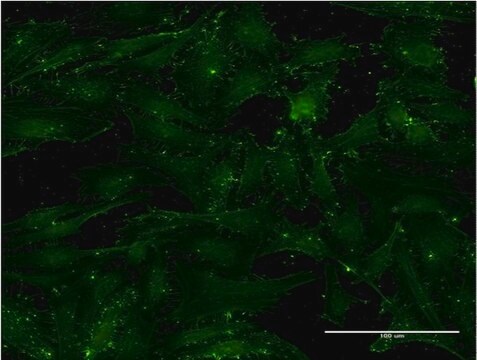SAB4700567
Monoclonal Anti-Cd9 antibody produced in rat
clone EM-04, purified immunoglobulin, buffered aqueous solution
Sign Into View Organizational & Contract Pricing
All Photos(1)
About This Item
UNSPSC Code:
12352203
NACRES:
NA.41
Recommended Products
biological source
rat
Quality Level
conjugate
unconjugated
antibody form
purified immunoglobulin
antibody product type
primary antibodies
clone
EM-04, monoclonal
form
buffered aqueous solution
species reactivity
mouse
concentration
1 mg/mL
technique(s)
flow cytometry: suitable
isotype
IgG1
NCBI accession no.
UniProt accession no.
shipped in
wet ice
storage temp.
2-8°C
target post-translational modification
unmodified
Gene Information
mouse ... Cd9(12527)
General description
The rat monoclonal antibody EM-04 recognizes CD9 antigen, a 24 kDa transmembrane protein expressed on platelets, monocytes, pre-B lymphocytes, granulocytes and activated T lymphocytes.
Immunogen
Permeabilized murine bone marrow-derived mast cells (BMMC)
Application
The reagent is designed for Flow Cytometry analysis. Suggested working dilution is 4 μg/mL of sample. Indicated dilution is recommended starting point for use of this product. Working concentrations should be determined by the investigator.
Features and Benefits
Evaluate our antibodies with complete peace of mind. If the antibody does not perform in your application, we will issue a full credit or replacement antibody. Learn more.
Physical form
Solution in phosphate buffered saline, pH 7.4, with 15 mM sodium azide.
Not finding the right product?
Try our Product Selector Tool.
Storage Class Code
10 - Combustible liquids
Flash Point(F)
Not applicable
Flash Point(C)
Not applicable
Choose from one of the most recent versions:
Certificates of Analysis (COA)
Lot/Batch Number
Don't see the Right Version?
If you require a particular version, you can look up a specific certificate by the Lot or Batch number.
Already Own This Product?
Find documentation for the products that you have recently purchased in the Document Library.
P J Schuler et al.
Clinical and experimental immunology, 177(2), 531-543 (2014-04-23)
While murine CD4(+) CD39(+) regulatory T cells (T(reg)) co-express CD73 and hydrolyze exogenous (e) adenosine triphosphate (ATP) to immunosuppressive adenosine (ADO), surface co-expression of CD73 on human circulating CD4(+) CD39(+) T(reg) is rare. Therefore, the ability of human T(reg) to
Makiko Ono et al.
Science signaling, 7(332), ra63-ra63 (2014-07-06)
Breast cancer patients often develop metastatic disease years after resection of the primary tumor. The patients are asymptomatic because the disseminated cells appear to become dormant and are undetectable. Because the proliferation of these cells is slowed, dormant cells are
Our team of scientists has experience in all areas of research including Life Science, Material Science, Chemical Synthesis, Chromatography, Analytical and many others.
Contact Technical Service
